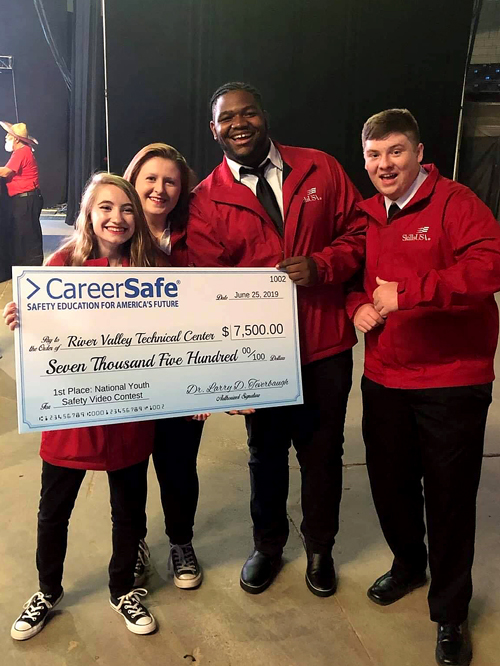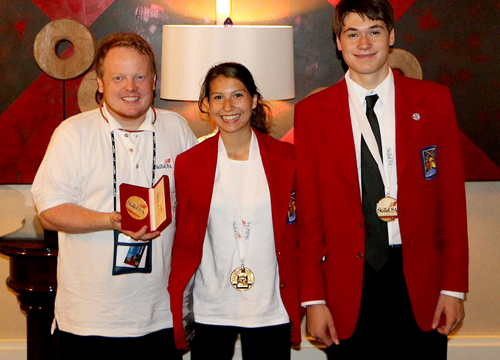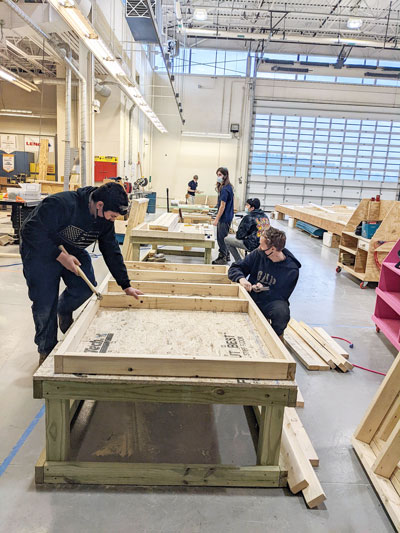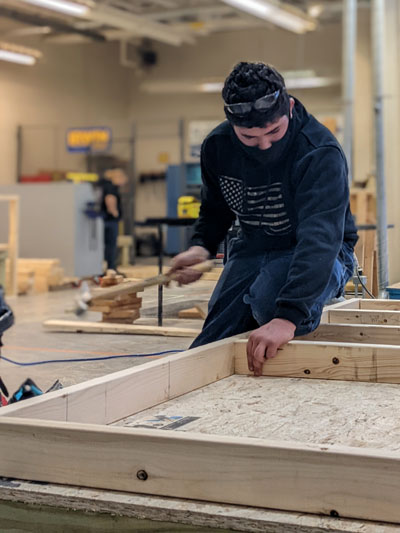- (802) 885-8300
- Fax (802) 885-8454
- Mon - Fri 7:30 AM-4:00 PM
Day-Time Programs
Advanced Manufacturing / Engineering
| |
 |
Christopher GrayPhone Number: (802)885-8321Email:
|
General Program Description:
Just about everything you use on a daily basis was manufactured. If you’re the type of curious person who likes to know how things work, this program was tailor-made for you. The program will stimulate your thinking, prepare you for life after high school, and provide you with marketable skills. The Advanced Manufacturing and Engineering program stimulates student thinking; prepares them for a lucrative job market; and provides students with valuable manufacturing and design skills. Topics of study include:
- Additive Manufacturing (3D Printing)
- Blueprint Reading and Geometric Dimensioning and Tolerancing,
- Precision Measurement,
- Technical Writing,
- Sketching and visual representation,
- Parametric Modeling and Computer Aided Drafting (CAD),
- Computer Numerical Control (CNC) Machining,
- Precision (manual) Machining,
- Digital Electronics,
- Robotics and Automation,
- Computer Aided Manufacturing (CAM),
- Metrology and Inspection,
- Waterjet Technology
- Fabrication and Assembly.
Advanced Manufacturing and Engineering Program students will receive entry-level training through hands-on challenges that mirror the processes utilized in all facets of manufacturing and engineering. Students produce functional parts through traditional and automated processes. A very strong emphasis is placed on safety, quality, and working to international industry standards/expectations.
Program Highlights:
- Earn up to 18 credits through the Running Start Program at River Valley Community College, Nashua Community College and NH Technical Institute-Concord
- Three sanctioned Project Lead The Way Pre-Engineering Courses over two years
- Access to more than 100 regional manufacturing and engineering companies through our Program Advisory for job shadows and internships
- Access to more than 75 Program Alumni through our Alumni Network.
- Full-day, Industry-based trainings like Lean 101 and Mastercam
Advanced Manufacturing and Engineering Level I
Credit: 3 elective credits
Eligibility: Students in grades 10, 11 and 12
Prerequisites: Algebra I or concurrent enrollment
Scheduled Class Time: Full-year; 2 hours per day, 7:45 AM to 9:45 AM
Highlights:
The manufacturing portion of Advanced Manufacturing and Engineering Level I will introduce you to machine tools, measuring instruments, and machining operations, and how they relate to the production of consumer goods. We’ll study the industrial models of both “job shops” and “production plants” and their relationship between engineering, design, production control, and manufacturing. Computer-Aided Manufacturing (CAM) and robotics will also be covered.
In the engineering portion of Advanced Manufacturing and Engineering, I will focus on design communication through the learning of SolidWorks parametric modeling software. It will also address many of the foundational elements and principles of engineering such as force, acceleration, mass, power, and trajectory.
The first-year curriculum was designed to be preparing students for the nationally recognized NIMS credentialing exams in seven machining areas. It will also prepare students to take the Certified SolidWorks Associate certification exam. In addition, we encourage students to build youth leadership skills by participating in our local and state chapters of SkillsUSA and competing in skill and leadership events at all levels.
Advanced Manufacturing and Engineering Level II
Credit: 3 Elective Credit
Eligibility: Students in grades 11 and 12
Prerequisites: Grade of 70 or better in Manufacturing I or written permission from the instructor, and Algebra II or concurrent enrollment
Scheduled Class Time: Full-year; 2 hours per day, 11:40 AM to 1:40 PM
 Highlights:
Highlights:
The strong engineering focus of the first semester of AM&E 2 is placed on digital electronics and advanced solid modeling (SolidWorks). Students will experience all aspects of digital electronics through hands-on breadboarding and simulation software. Students will build a variety of digital projects and also learn to build and program microcontrollers like Arduino. Advanced robotic programming and construction will also be highlighted in Level 2. Engineering Design and Development is the senior capstone of the PLTW curriculum. Students normally dedicate their entire fourth quarter to this independent, industry-driven capstone project and are evaluated by industry professionals upon its completion.
On the manufacturing side of the curriculum, students will become proficient in Mastercam computer aided manufacturing software as well as develop skills in setting up, operating, and programming 3, 4, and 5 axis CNC machines. Additive manufacturing (3D printing) is also emphasized in this heavily lab-based curriculum. Several NIMS credentials are available in both CNC Turning and CNC Milling. The use and programming of the Coordinate Measuring Machine (CMM) and its related software (Verisurf) is also taught in year 2. Field trips, job shadows, and internships are also an integral part of the year 2 curriculum.
Post Secondary Opportunities:
- Associate of Science (A.E.) - Mechanical Engineering Technology
- Associate of Applied Science (A.E.) - Electrical Engineering Technology
- Associate of Applied Science (A.A.S.) - General Engineering Technology
- Bachelor of Science (B.S.) - Sustainable Product Design & Innovation
- Bachelor of Science (B.S.) - Electromechanical Engineering
- Bachelor of Science (B.S.) - Electrical Engineering
- Bachelor of Science (B.S.) - Mechanical Engineering
Career Opportunities:
- Automation Technician
- Architect/Civil Engineering
- CADD Operator/Drafter
- CNC Operator
- CNC Programmer
- Electrical Line Worker
- Machinist
- Machine Set-Up Technician
- Machine Operator
- Machine Mechanic and Maintenance
- Materials Sourcing Agent
- Mechatronics Technician
- Purchasing Agent
- Production Controller
- Production Planning
- Production Manager/Supervisor
- Engineer - Mechanical
- Engineer - Mechatronics
- Engineer - Electrical
- Engineer - Manufacturing/Production
- Prototype Designer
- Fabricator
Dual Enrollment / Early College Opportunities:
River Valley Community College - MTTN101R - CNC I
Course Description: G&M Code Programming is the study of the alpha-numeric language executed by Computer Numerically Controlled (CNC) machines. The fundamentals studied in this course will include the format of CNC programs, common G-Codes, M-Codes, as well as materials and speeds & feeds. This course will also introduce applicable machine shop-related math.
River Valley Community College - MTTN106R - Machine Processes I
Course Description: Machining Processes I covers the machining theory which comprises both manual and CNC (computer-numerical controlled) machining practices. This course outlines the practical applications of safety, measurement and inspection, blueprint reading, metallurgy, and turning/milling technologies as they relate to both manual machining and CNC machining.
NHTI - MFET 241C - Computer Integrated Manufacturing
Course Description: A study of flexible industrial automation as it applies to the product-producing industry. Particular emphasis is on robotics, numerical control, and computer integrated manufacturing. The basic theory and application of these areas are studied. In the laboratory portion of the course, the student has the opportunity to set up, program, and operate all aspects of a computer-controlled manufacturing system.
NHTI - MCET 105C Engineering Design
Course Description:
This course introduces students to the fundamentals of engineering design and professional practice through the use of hands-on projects. Students will learn about the design cycle and the necessary steps to complete a successful project as a member of a team. Topics include problem identification, brainstorming, drawing and documentation, reverse engineering, testing and evaluation, and manufacturing. Cost, safety, and environmental issues are considered as well as ethical and professional responsibilities. Students will document designs using industry-standard 3D modeling software and will be required to communicate their designs through written, oral, and graphical presentations.
NCC - ELET 115C — Digital Electronics
Course Description: A beginning course in electricity, this course covers basic electric circuit theory, the nature of electricity, resistance, current, and voltage. Detailed coverage of topics includes direct current, alternating current, Ohm's law, series circuits, and parallel circuits as well as energy and power relationships. This course also covers DC circuit analysis techniques including mesh and nodal analysis, and network theorems such as Norton's, Thevenin's, and maximum power transfer. The transient response of capacitors and inductors is discussed when a DC voltage is applied using various circuit and analysis techniques. Additional topics include the discussion of alternating waveform characteristics and analysis of sinusoidal alternating waveforms. Laboratory experiments are designed to reinforce classroom work. (Corequisite: MATH 124C; or permission of the Department Chair of Electronic Engineering Technology. Strongly recommend having previously taken or to be concurrently taking ELET 115C.)
 Embedded Academic Credit:
Embedded Academic Credit:
Math, (Algebra II and Trigonometry, Statistics)
Physical Science - Applied Physics
English - Technical Writing
*One credit (total) after completing two years of the program
Vendor Curriculum: Project Lead the Way
-
- Introduction to Engineering Design
- Computer Integrated Manufacturing
- Digital Electronics
Vendor Curriculum: Tooling U/SME - Online Manufacturing Training
- Access to over 400 online advanced manufacturing, self-paced curriculum modules, and assessments
Vendor Curriculum: Immerse2Learn - Online CNC Training Curriculum (HAAS)
- Licensed CNC Simulation software and curriculum that can be accessed from ANY web-based computer or tablet.
Vendor Curriculum: CamInstuctor
- Mastercam 2023 Training
- CNC Mill Set-up and Programming
- CNC Lathe Set-up and Programming
- CNC 4th and 5th Axis Set-Up and Programming
Industry Recognized Credentials:
- National Institute of Metalworking Skills (Up to 7 different IRC’s)
- Certified Manufacturing Associate (SME)
- Certified Manufacturing Technician (SME)
- Robotics Fundamentals in Manufacturing (SME)
- Certified SolidWorks Associate (CSWA)
- Certified SolidWorks Professional (CSWP)
- Certified Mastercam User
- HAAS Certification (Operator, Set-Up, and Programmer)
Vermont Career Technical Education (CTE) Program Critical Proficiencies
Advanced Manufacturing, Manufacturing, Mechatronics CTE Programs
Pre-Tech Foundational CTE Programs
Program Advisory Members and Organization:
-
Bob Flint - Springfield Regional Development Corporation
-
Carl Hurd - Cedarwood Technical Services LLC.
-
Warren Garfield - Lovejoy Precision Cutting Tools
-
Kristi Morris - Lovejoy Precision Cutting Tools
-
Dan Osborn - River Valley Community College
Student/Parent Quotes:
“I love this class because everything I learn is directly related to the career I want to pursue. Mr. Gray has high expectations for his students but he always helps us achieve our goals”. ~Bradon Wright“Mr. Gray is the only teacher I have that holds me accountable. He’s willing to do what it takes to make sure we succeed." ~Landon Palmisano
“This class goes by so fast. There is always something to do, and we are always learning new things.” ~Nathaniel Thomas
Pre-Tech Foundations/Intro Course Description - Springfield High Only
Introduction To Advanced Manufacturing and Engineering
½ elective credit (1 Semester)
1 elective credit (Full Year)
Instructor: Mr. Gray
Prerequisite: Algebra One (full-year option ONLY)
Almost EVERYTHING we touch, use, and even eat daily is somehow connected to manufacturing. Manufacturing is the foundation for all other industries. Engineering is the application of scientific principles and practices to real-world problems to find solutions. Introduction to Advanced Manufacturing and Engineering provides the tools and technologies to make these solutions a reality. You can’t have one without the other. This introductory course will allow students to explore the many types of engineering and manufacturing in a “hands-on” way. Students will design and build single-cylinder motors, robots, and drones using both software and hardware (tools). They will also learn a variety of programming languages. Students will explore the wide variety of lucrative career options in advanced manufacturing and engineering that exist right here in our region through multiple field trips and other industry visits. This course follows the Project Lead the Way national engineering curriculum. Freshmen can take this class for the full-year option and earn up to three (3) Early College in High School (dual enrollment) credits at New Hampshire Technical Institute (NHTI) in Concord, NH. The full-year version is only recommended for students who completed Algebra One in 8th grade.
Audio Video Production
Program Instructor:
 |
 |
Zachary McNaughtonAudio Video Production Instructor and Digital Media Production Instructor [online]Phone: (802)885-8326Email:
|
Jared GunnellAudio Video Production InstructorPhone: (802)885-8326Email:
|
General Program Description:
The Audio Video Production program at RVTC is unique in that it is divided into individual Audio and Video “pathways.” This program is designed to allow students to customize their learning experience through these pathways in order to focus on each individual student’s career goals. AVP is a two-year program. Level one students start with the AVP101 Pathway, which is designed to give students a foundation of technical skills that will be needed in order to be a successful program completer. After AVP101, students can move fluidly between the audio, video, and photography pathways at the start of each quarter.
Eligibility: Grades 10-12
Credit: 2-3 Elective Credits
Scheduled Class Time:
Full-year; 2 hours per day
AM Session: 7:45 AM to 9:45 AM
PM Session: 11:40 AM to 1:40 PM
Prerequisites:
Level 1: Grade of 70 or better in English or an Interview
Level 2: Grade of 70 or better in Audio Video Production I or written permission from the instructor
Here is a sample list of available pathways:
AVP 101: Introduction to Multimedia Applications (College Credit Available)
Learn the theoretical foundations of audio and video production. Apply this theory to a series of collaborative lab assignments designed to teach the basics of AVP.
Digital Photography (College Credit Available)
Learn the technical foundations of digital photography with an emphasis on camera operation and image composition.
Field Recording
Learn the technical foundations of audio engineering with an emphasis on mobile audio recording and editing.
Radio Production
Learn the technical foundations of storytelling with audio with an emphasis on SkillsUSA contest preparation.
Corporate Video Production
Learn the technical foundations of creating commercials, training videos, and other promotional videos with an emphasis on SkillsUSA contest preparation.
Digital Cinematography
Learn the technical foundations of storytelling and scriptwriting with an emphasis on SkillsUSA contest preparation.
Photoshop Effects
Learn the technical foundations of image processing with Adobe Photoshop.
Session Recording
Learn the technical foundations of recording music in a studio environment with an emphasis on microphone selection, multitrack mixing, and music recording.
Sound Design for Film
Learn the technical foundations of sound design, foley, and music selection in order to create realistic soundscapes for a film.
Advanced Photography
Take your photography skills to the next level by controlling your camera and environment like never before. This pathway has an emphasis on studio photography and image manipulation.
Studio Production
Take your influencer show to the next level with AVP’s new Broadcast Studio. Interested in creating your own TV Show? During this Pathway, we’ll cover the basics of live multi-camera production and create content for Community Access TV with the ability to go LIVE on the air!

Student Organizations:
Students will also have the opportunity to compete at the Skills USA Vermont Leadership and Skills Conference in the areas of TV Production, Radio Production, and Digital Cinematography. The team that wins in each category will go on to represent Vermont at the National Leadership and Skills Conference.
Post Secondary Opportunities:
- Associate of Arts (A.A.) - Multimedia Communications
- Associate of Science (A.S.) - Visual Communications
- Associate of Science (A.S.) - Electronic Journalism Arts
- Bachelor of Science (B.S.) - Music Business and Industry
- Bachelor of Science (B.S.) - Audio Engineering
- Bachelor of Science (B.S.) - Video Production
 Career Opportunities:
Career Opportunities:
- Multimedia communications
- Camera Operators
- Video Editor
- Video/Audio Technician
- Audio/Video Sales
- THx/DTS Tech
- Live Sound & Light Engineering
- Studio Production
Dual Enrollment / Postsecondary Agreements: Community College of Vermont
ART-1310 - Digital Photography I
Course Description: Students will explore the mechanical and electronic aspects of digital photography as well as the basic tools of image manipulation. The course also includes the study of design, composition, and aesthetics of digital images. Prerequisite: Microcomputer Applications I. Access to a digital camera and some previous photography experience is required.
CIS-1045-VG01 - Introduction to Multimedia Applications & Tools
Course Description: This course introduces the many applications that enhance the world of multimedia and the web, as well as the technological decisions that are needed to deploy them. Students will learn how various tools are used to create a rich, dynamic audio/visual experience for users in many different formats. Emphasis is given to understanding current, new, and emerging technologies and the impact they have on web-based media. Students enrolling in the course should have basic computer skills.
 Articulation Agreements
Articulation Agreements
New England School of Communications - 1 Elective Credit
Keene State College - Up to 8 Credits
Embedded Academic Credit: Science
Industry Recognized Credentials:
- Final Cut Pro - Apple
- Motion 101 Training - Apple
- CareerSafe OSHA 10-Hour - OSHA
- Internet & Computing Core - Computing Skills - Certiport
- Adobe Certified Associate- Dreamweaver - Adobe
- Adobe Certified Associate-Flash - Adobe
- Adobe Certified Associate-Photoshop - Adobe
- Adobe Certified Associate-Illustrator - Adobe
- Adobe Certified Associate-InDesign - Adobe
- Adobe Certified Associate-Premier - Adobe
- Internet & Computing Core - Key - Certiport
- Internet & Computing Core - Living Online - Certiport
- Web Administrator Apprentice
- Web Designer Apprentice - Web professionals
- Web Developer Apprentice - Web professionals
- Webmaster Apprentice - Web professionals
Vermont Career Technical Education (CTE) Program Critical Proficiencies
Digital and Visual Arts CTE Programs
Pre-Tech Foundational CTE Programs
 Program Advisory Members and Organization:
Program Advisory Members and Organization:
- Jared Gunnell: Red J. Media LLC
- Bettyann Casella: IT Consultant
- Patrick Cody: OVTC Executive Director
- Rob Murray: Audio Mixing & Mastering (Chairperson)
- Rebekah Ferreira: OVTV Production Manager
- Chris Maggiolo: BRIC
- Kyle Rogstad: Indelible Inc.
- John Sawyer, Vermont Recording Studio
- Joe Defelice: Riverbank Media
- Bob Merrill: Sweetspot Digital
- Suzanne Groenewold: Fall Mountain Productions
- Johnny Gifford: Director, SAPA TV
Program Links:
Facebook.com/RVTCStudios
Student/Parent Quotes:
“Our son making the decision to take the AVP program at RVTC was a godsend. He had always struggled in traditional learning situations so the hands-on teaching he received at RVTC gave him the confidence to make his own mark on the world. The instructor Zachary McNaughton is extremely talented and engaging, and the skills Tanner gained are already being seen as he combines his newly acquired video skills with his passion for cars. We couldn’t be more pleased with the results of his studies and would highly recommend students take advantage of this valuable opportunity in our community.”
Armin & Donna Bischofberger, parents of Tanner Bischofberger
“I came out of the AVP program more prepared to work in the audio-video industry than most of my peers are graduating from a well accredited four-year film college."
Aja Selbach, AVP Alumni/Syracuse University Film Graduate
My son, Elliot, was introduced to The River Valley Technical Center in his freshman year at Springfield High School in 2013. The center provides freshmen an immersion experience to learn about several of the programs. Students can then choose a program that fits their interests and needs In the fall of their sophomore year. Elliot entered the AVP (Audio-Visual Program) at Level 1 under the guidance of his teacher, Zachary McNaughton in 2014 and completed Level 2 the following year. This decision literally changed Elliot's life and direction as a student. Through access to state of the art equipment, frequent collaboration projects, conferencing with his teachers, freedom to choose creative content, and opportunities to compete at state and national levels, being an active member of RVTC helped to shape Elliot's future well in advance. During his undergraduate experience, Elliot and one of his classmates won several state titles and earned the National first-place award for TV production in 2014 at the Skills USA competition in Kansas City, MO. He produced several independent films, ads, and public service videos that were recognized in his town and at local and state film competitions. This would not have happened without his affiliation with RVTC. Most importantly, when gathering the supplemental material for his portfolio for application to major US college film schools, Elliot was solidly prepared. Four out of the 6 top film schools accepted/waitlisted his application. Now in his junior year at the #6 ranked Dodge Film School at Chapman University in Orange, CA, Elliot has confidently produced films with skills learned from his foundational work at RVTC. As a parent, I highly recommend this experience for a high school student in the Connecticut River Valley who is seeking to learn a trade or set of specialized skills that will place him or her in the workforce with confidence. Thank you to his teacher, Mr. McNaughton, the staff, and the director of this high-quality institution for helping him achieve his dreams.
Ann Thompson, Parent of Elliot Thompson
Pre Tech Foundations/Intro Course Description
Introduction To AVP: Audio Engineering
Credit: ½ credit
Instructor: Mr. McNaughton
Eligibility: Springfield High School Only
Description: During this Intro students will explore several forms of multimedia with an emphasis on editing audio, video, and images. Students will explore software such as; Final Cut Pro, Avid Pro Tools, and Adobe Photoshop using tutorials designed to teach specific techniques related to Audio and Video Production.
Business Management & Entrepreneurship
Program Instructor:
 |
Jennifer CummingsPhone Number: (802)885-8337Email:
|
General Program Description:
The Business Management & Entrepreneurship program is designed to provide students with a comprehensive understanding of business principles and entrepreneurship. The program focuses on both theoretical knowledge and practical skills, offering hands-on training through activities such as working in the school store (Campus Connection). The skills acquired in the program can be applied to various careers and fields beyond traditional business roles.
Future Business Leaders of America (FBLA) involvement adds an extra layer of opportunity for students to develop leadership skills and connect with a broader business community. Overall, the program prepares students for entrepreneurship but also equips them with versatile skills applicable to different career paths, whether they choose to pursue further education in business or directly enter the workforce.

Program Highlights:
-
-
-
- Embark on a two-year immersive experience overseeing the operations of the school store (Campus Connection). From managing sales and inventory to crafting effective advertising campaigns and implementing cash planning strategies, you'll gain hands-on expertise across various business facets.
- Master the art of crafting a comprehensive business plan, laying a solid foundation for any successful venture.
- Harness your creativity as you design and execute your own advertising campaigns, developing practical skills that extend beyond the classroom.
- Cultivate invaluable leadership and management skills essential for navigating the dynamic business landscape.
- Embark on a two-year immersive experience overseeing the operations of the school store (Campus Connection). From managing sales and inventory to crafting effective advertising campaigns and implementing cash planning strategies, you'll gain hands-on expertise across various business facets.
-
-
Business Management & Entrepreneurship Level I
Credit: 3-4 elective credits
Eligibility: Students in grades 10, 11 and 12
Prerequisites: None
Scheduled Class Time: Full-year; 2 hours per day, 7:45 AM to 9:45 AM or 11:40 AM to 1:40 PM
Business Management & Entrepreneurship I Highlights:
In the first year of the Business Management & Entrepreneurship program, students delve into the fundamental aspects of business, with a primary emphasis on establishing a robust financial foundation. The opening focus of the year is on Personal Financial Management, where students gain a comprehensive understanding of their individual finances. This knowledge serves as a crucial precursor to handling the financial intricacies of a business.
Transitioning into the second semester, the program's curriculum strategically pivots toward the dynamic realm of Digital Marketing. Throughout the semester, students gain valuable insights into contemporary marketing methodologies, digital platforms, and emerging trends that are instrumental in crafting effective and impactful marketing campaigns.
Students not only grasp theoretical concepts but also acquire practical experience by actively participating in Campus Connection, the school store. This hands-on involvement allows them to apply the acquired knowledge in a real-world setting, enhancing their skills and preparing them for the dynamic challenges of the business environment.
Business Management & Entrepreneurship II
Credit: 2-3 Elective Credit
Eligibility: Students in grades 11 and 12
Prerequisites: Grade of 70 or better in Business and Financial Services I or written permission from the instructor
Scheduled Class Time: Full-year; 2 hours per day, 7:45 AM to 9:45 AM or 11:40 AM to 1:40 PM
 Business Management & Entrepreneurship Level II Highlights:
Business Management & Entrepreneurship Level II Highlights:
In Business Management & Entrepreneurship II, students delve deeper into the multifaceted world of business operations. The first semester of the course unfolds as an immersive exploration into the realm of Small Business Management. During this phase, students actively engage in a hands-on business simulation designed to replicate the challenges inherent to starting and sustaining a small business venture.
Transitioning into the second semester, the focus shifts to QuickBooks, a preeminent financial accounting software widely embraced across various industries. Through interactive modules, students gain practical experience in utilizing QuickBooks, honing their skills in financial tracking, reporting, and analysis. The emphasis on QuickBooks not only enhances students' proficiency in a vital business tool but also underscores the significance of efficient financial management in sustaining and scaling enterprises.
In essence, the Business Management & Entrepreneurship II course transcends traditional learning paradigms, providing students with a holistic and experiential education that prepares them to navigate the complexities of contemporary business environments with confidence and proficiency.
Post-Secondary Opportunities:
Pursue an Associate’s, Bachelor’s, or Master’s degree in one of the following areas:
- Business Management
- Accounting
- E-commerce
- Marketing
- Small Business Management & Entrepreneurship
- Business Administration
- Finance
- General Business

- Sports Management
- Communications & Advertising
- Business Education
- International Business
- Human Resource Management
- Business Technology
Career Opportunities:
- Banking
- Retail
- Sports & Entertainment Marketing
- Account Executive
- E-Commerce
- Real Estate Sales
- Accountant or Bookkeeper
- Investor/Entrepreneur
- Small Business Owner
- Advertising & Promotion
- Insurance
Embedded Academic Credit: English and Math
Dual Enrollment / Postsecondary Agreements:
Year 1: River Valley Community College - ACCT 207R - Personal Financial Management (3 credit hours)
Course Description: This course is designed to provide an overview of all aspects of personal financial management, including budgeting, tax planning, retirement planning, and personal investments.
Year 2: River Valley Community College - BUS 204R - Small Business Management (3 credit hours)
Course Description: A study of management techniques as applied to small businesses. Includes requirements necessary in launching a new venture and managing an ongoing business. Topics covered include business plan development, computer applications, human resources, purchasing, marketing, taxation, and risk management and control procedures. Requires students to develop a comprehensive business plan for a new venture of their choosing, which is presented as both an oral and written proposal.
Industry Recognized Credentials:
- Servsafe Basic Food Handler
- QuickBooks Certified User Online
Vermont Career Technical Education (CTE) Program Critical Proficiencies
Pre-Tech Foundational CTE Programs
Program Advisory Members and Organization:
- Dan Richardson - Edward Jones
- Caitlin Christiana - Director of Community & Culture, Black River Innovation Campus
- Todd Priestley - President, Lovejoy Tool
- Sue Dana - Senior Solutions Finance Director & CPA
- Marie Gelineau - Retired Banking Industry
- Mike Schmidt - Founder & Owner, Black River Coffee Bar
- Kelly Broker-Campbell - Outreach Coordinator, RVTC
- Renee Hebert - Assistant Vice President, M&T Bank
Program Links:
Find us on Facebook: RVTC Campus Connection.
Student/Parent Quotes:
"Business & Financial Services and DECA have not only taught me the basic skills required for business but skills that will help me in any career path. DECA, especially, has given me the confidence in my abilities to present myself to any audience."
"Business & Financial Services taught me how to be a successful leader and business owner. It has taught me patience and persistence when working with others, that in working together we can create amazing things."
"My Business & Financial Services class has taught me how to properly run and operate a business. It will help me in my future plans of possibly running and operating our family farm."
“The Business Program at RVTC shaped my life and who I am today.” - Former Student.

Pre Tech Foundations/Intro Course Description - Springfield High Only
Introduction To Business Management & Entrepreneurship
½ credit
Instructor: Ms. Cummings
This foundational course offers practical, hands-on learning experiences encompassing accounting, management, marketing, human resources, production, and distribution. Additionally, students will delve into the diverse range of rewarding career opportunities within the business field. The curriculum not only imparts essential business principles but also illustrates how these principles can positively impact both professional careers and personal lives
Carpentry
Program Instructor:
| |
|
Josh ChamberlainPhone Number: (802)885-8330Email:
|
General Program Description:
The RVTC Carpentry Program is ideal for the individual who wants to learn more about carpentry and construction. Complete several projects using the school’s first-rate tools and equipment. Every year, we even build a house right here in our massive workshop.
Students learn to build, design, and gain the skills needed for a career in Carpentry. They start by building sheds and other small projects. They create materials lists, research vendors, and order what they need to build a house. They discover the theory and practice of construction as a profession. Construction projects through hands-on experiential learning are the focus of the work in Carpentry. Students also develop leadership skills through the local SkillsUSA Chapter and participate in local, state, regional, and national activities. Students may become nationally credentialed through National Center for Construction Education and Research (NCCER). In the second year, students have an opportunity to refine their skills by building a full-sized house right in the lab.
Program Highlights:
• Hands-on training with the latest technology and equipment, including pneumatic nail guns, circular saw, and a sliding compound miter saw.
• Cooperative work placements and apprenticeships are available.
• Gain leadership skills through the local SkillsUSA Chapter
• Take part in state and national activities and competitions
• Participate in hands-on construction projects in class, including building sheds and a full-size modular house.
Carpentry Level I
Credit: 3-4 elective credits
Eligibility: Students in grades 10 with permission, 11 and 12
Prerequisites: Basic Algebra and Geometry Skills
Scheduled Class Time: Full-year; 2 hours per day, 7:45 AM to 9:45 AM
Carpentry Level I Highlights:
Build your future, literally, in this program. From the beginning, you’ll get involved in both the theory and practice of construction as a profession. Guest craftspeople will offer special presentations, but most of your work will be done right in the on-site workshop, using high-quality modern tools. In year one of the program, students are introduced to the common tools, materials, and basic techniques involved in residential construction. They then put these skills into practice by building a shed from start to finish in small cooperative groups.
Carpentry Level II
Credit: 2-3 Elective Credit
Eligibility: Students in grades 11 and 12
Prerequisites: Grade of 70 or better in Carpentry I or written permission from the instructor
Scheduled Class Time: Full-year; 2 hours per day, 11:40 AM to 1:40 PM
Carpentry Level II Highlights:
In your second year, you’ll refine your carpentry and other construction skills while building a house. Students will take the construction project from start to finish and have a chance to participate in each step of the building process. Students may also have the opportunity to participate in cooperative work placements, apprenticeships, or job shadows to get the real-world experience they need to progress.
Post-Secondary Opportunities:
-
Associate of Applied Science (A.A.S.) - Construction Practice and Management
-
Associate of Science - Construction and Cabinet Making Technology
-
Associate of Applied Science (A.A.S.) - Architectural/Building Engineering Technology
-
Bachelor of Science (B.S.) - Architectural Engineering Technology
-
Bachelor of Science (B.S.) - Construction Practice and Management
Career Opportunities:
- Carpenter
- Carpenters Helper
- Estimator
- Construction Management
- Construction Manager
- Building Inspector
- Construction Electrician
- Mason
- Plumber
- Plasterer
Embedded Academic Credit: Math
 Industry Recognized Credentials:
Industry Recognized Credentials:
- 10-hr OSHA Certificate - OSHA
- NCCER Construction Core - NCCER
- NCCER Carpentry 1 - NCCER
Vermont Career Technical Education (CTE) Program Critical Proficiencies
Carpentry, Construction, Building Trades CTE Programs
Pre-Tech Foundational CTE Programs
Program Advisory Members and Organization:
- Joe Poston -Wright Construction
- Ed Druke- WW Building Supply
- Jon Miller- WW Building Supply
- Michael Grimes - Prefered Builders
- Dave Dancross-All Season Construction
Program Links:
RVTC Carpentry at YouTube
http://www.youtube.com/carpentryrvtc
National Center for Construction Education & Research
https://www.nccer.org/
Contren Connect
Pre Tech Foundations/Intro Course Description - Springfield High Only
Introduction To Carpentry
½ credit
Instructor: Mr. Chamberlain
Interested in building things? Intro to Carpentry will give students the opportunity to explore the basics of the trade of carpentry through small building projects such as dog houses. You will learn to use power tools and the basics of how a structure goes together. Take the first step toward building your future!
Co-op
Click here for the Co-op webpage.
| |
 |
Dave CulverPhone Number: (802)885-8314Email:
|
Criminal Justice
Program Instructor:
| |
Tim GouldPhone Number: (802)885-8327Email:
|
General Program Description:
Criminal Justice students discover the history, organization, and function of local, state, and federal law enforcement. They learn to utilize communication skills in creating, conveying, and interpreting information and ideas. Students propose solutions to address problems associated with law enforcement, study court cases, determine the impact of court decisions, and analyze procedural and substantive criminal laws that look into reasonable suspicion and probable cause. Students learn fingerprinting and how to process a crime scene using dusting procedures. Guest speakers, field trips, and the use of industry-specific equipment and supplies are an essential part of the curriculum. Students become acquainted with legal concerns associated with a criminal investigation, gain knowledge of terminology and investigative procedures related to a crime scene, and questions, interviews, criminal behavior characteristics, and truth detection. They develop skills to evaluate body language, gestures, and verbal tone. Students study law enforcement procedures pertaining to alcohol laws and driving under the influence. By merging classroom lectures with practical exercises students come to understand various investigative procedures in Criminal Justice and the law.

Criminal Justice is the framework to the inner mechanisms of the three significant criminal justice functions in the United States, Courts, Corrections, and Law Enforcement. This course will give the students an overview of policing in America, the historical development of policing worldwide and locally, and the implementation of community-based policing and criminal investigations. The course will discuss and explain the prosecution, disposition, and incarceration of those suspected of committing criminal offenses along with focusing on the realities of enforcement and the apprehension of criminals at the federal, state, and local levels.
Throughout the two years, an emphasis will be placed on developing reading, writing, and interpersonal communication skills, critical thinking, logical reasoning, and problem-solving skills. Students will interact with members of law enforcement, corrections, and the court system and they will be able to learn from their know-how. Careers in each area will be explored and students will learn more about the expectations and training required for various career options in the criminal justice field.
Program Highlights:
- Students can convert nine (9) FEMA EMI Independent Study courses into college credit from Frederick Community College.
- Class Instructors and guest instructors with real-world experience in their field.
- Internship opportunities with different areas of criminal justice agencies.
- Students have the chance to assist in the training of new law enforcement officers at the Vermont Police Academy by participating in role-playing exercises.
Criminal Justice Level I
Credit: 3-4 elective credits
Eligibility: Students in grades 11 and 12
Prerequisites: None
Scheduled Class Time: Full-year; 2 hours per day 7:45 AM to 9:45 AM
Highlights:
Level One Criminal Justice students complete practical applications, classroom learning, and technology, a solid introduction to the different functions within the criminal justice field.
Criminal Justice Level II
Eligibility: Students in grades 11 and 12
Prerequisites: Signed medical release
Scheduled Class Time: Full-year; 2 hours per day 11:40 PM to 1:40 PM
Highlights: Level Two Criminal Justice students learn the many subsystems within the criminal justice system with an emphasis on criminal investigation. Upon completion of this two-year program, students will be prepared to enter a post-secondary criminal justice program.
Post Secondary Opportunities:
- Associate of Science (A.S.) - Criminal Justice
- Bachelor of Science (B.S.) - Criminal Justice
- Bachelor of Science (B.S.) - Pre-Law - Government- Criminal Justice
Career Opportunities:
- Police Officer
- Detective
- Crime Scene Investigator
- Corrections Officer
- Parole Officer
- Fish and Game Warden
- Lawyer
- Paralegal
- Victims Advocate
- Court Clerk
- Investigator
- Security Guard
Dual Enrollment / Postsecondary Agreements:
Frederick Community College
Prerequisites: During the two years in the Criminal Justice program, students will take a number of online self-paced courses through the FEMA/EMI Independent Study. Upon successful completion of each of these courses, students will receive an Industry Recognized certificate. It is possible for students to earn transferable academic credit for completion of Independent Study courses into college credit through an agreement with Frederick Community College (at student expense).
Embedded Academic Credit: Social Studies (Vermont students only)
Industry Recognized Credentials:
- Guardian Accord Workshop - FEMA
- Hazardous Materials Prevention - FEMA
- Active Shooter: What You Can Do - FEMA
- Surveillance Awareness: What You Can Do - FEMA
- Protecting Critical Infrastructure - FEMA
- National Incident Management System - FEMA
- Multi-hazard Emergency Planning for Schools - FEMA
- Radiological Emergency Response - FEMA
- Effective Communication - FEMA
- Introduction to Incident Command System - FEMA
- ICS for Single Res. & Initial Action Incidents - FEMA
- Emergency Response - FEMA
- ICS for Law Enforcement - FEMA
- Workplace Violence Awareness - FEMA
- Decision Making and Problem Solving - FEMA
- Radiological Emergency Management - FEMA
- Introduction to Haz-Mat - FEMA
Vermont Career Technical Education (CTE) Program Critical Proficiencies
Law Enforcement, Public Safety, Emergency and Fire Services CTE Programs
Pre-Tech Foundational CTE Programs
Program Advisory Members and Organization:
- Scott Richardson - Springfield Fire Department (Deputy Chief)
- William Daniels - Weathersfield Police (Police Chief)
- Walter Morency - Springfield Police (Police Chief)
- Mark Fountain - Springfield Police (Police Chief)
- Jeffrey Billings - Ludlow Police (Police Chief)
- Marcello D’Alessandro - SRO Hinsdale
- Richard Cloud - Chester Police (Police Chief)
- Thomas Williams - Vermont State Police (Sergeant)
- Michael Ruse - Vermont DMV (Investigator)
- Ladd Wilbur - Vermont Liquor Control (Investigator)
- Paul Stagner - Springfield Fire (Captain)
- Kelly Ryan - Springfield School District (Special Ed Director)
- Jennifer Dodge - Springfield School District (English Teacher)
- Kim McLeod - Vermont Liquor Control (Investigator)
- Steve Waldo - Vermont Liquor Control (Investigator-Ret.)
- Robert Kelcey - Springfield PD (Detective)
Program Links:
Student/Parent Quotes:
“This class makes you look at yourself as a human being and helps you discover who you want to be.”
“This class taught me about the different opportunities within the criminal justice field.”
This class has brought out the best in me. This is one of those times that I will never forget.”
Pre-Tech Foundations/Intro Course Description - Springfield High Only
Introduction To Criminal Justice
½ credit
Instructor: Mr. Alvarez
The elective will be an introductory course in forensic science. The primary focus is on practicing forensic science and analyzing physical evidence found at crime scenes. Students will be taught the basic processes and principles of scientific thinking so as to apply them to solving problems that are related not only to criminal investigation but to all disciplines.






